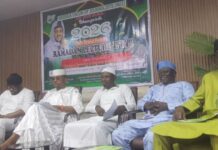A former Minister of Power, Prof. Barth Nnaji has said Nigerians have been experiencing poor power supply and development challenges because the country still needs to fix three major things in that critical sector.
He highlighted these reasons to Prime Business Africa in Enugu.
Nnaji, now the Chief Executive Officer of Geometric Power, said the three planks of the multi-faceted problem are: Lack of gas supply for existing plants, dilapidated or inadequate transmission and distribution infrastructure as well as ‘man-made’ disruptions along the power supply value chain
While speaking to Prime Business Africa in his Enugu residence, he said: “The problem of power supply in Nigeria is multi-faceted. In the power sector, we have generation, transmission and distribution. There are various issues along the value chain of power supply. The fuel (gas) supply is not adequate yet.
“There are issues of vandalism of gas pipelines which has grave effects on power generation.”
Nigeria has plans to generate 30,000 megawatts by 2030 with 3,000 megawatts coming from renewable energy sources and 27,000 megawatts from power plants.
Actualizing this goal, however, remains a big challenge, as, according to Nnaji, the country has an installed power supply capacity close to 13, 000 megawatts, but only able to output 5, 000 megawatts due to various constraints.
“Nigeria has an installed power supply capacity close to 13, 000 megawatts on grid but 7, 000 megawatts available for supply, available because the generating system is available for supply.
“However, our capacity to actually boost the power on grid is about 5, 000 megawatts.
“This means that two types of constraints make it impossible for us to put 7, 000 megawatts on grid, one of which is the gas supply, but mainly the transmission infrastructure.
“The transmission infrastructure makes it difficult for power to be supplied. And that’s a serious problem.
“Coming to distribution aspect, the infrastructure is dilapidated.
“There is also human factor problem on distribution such as connection inefficiencies, leakages, people stealing power, and all kinds of things done by people that make it difficult for efficient distribution, and also, the distribution companies themselves who are not investing in infrastructure which brings about inability to supply power.”
Nnaji compared Nigeria with Brazil in terms of population and said that if the country aspires to become a mid-level economy, it needs to produce up to 100, 000 megawatts or more, which Brazil produces.
“I like to think of we paring ourselves against Brazil. It is a comparable country in terms of population. We aspire to be a mid-level economy.
“If we are going to be a mid-level economy, then we should clearly be talking about having the sort of power supply that Brazil has, which is over 100, 000 megawatts. If we are going to have 100, 000 megawatts of power supply, then we need to have transmission lines to match that capacity, but we don’t have it”.






